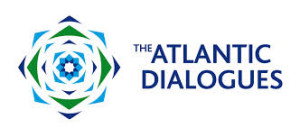- Washington “follows with interest” Morocco’s openness onto Africa (John Kerry)Posted 11 years ago
- The trial of South African Paralympic champion Oscar Pistorius opened in Pretoria on Monday.Posted 11 years ago
- USA welcomes efforts of King Mohammed VI in MaliPosted 11 years ago
- Egypt’s population reaches 94 millionPosted 11 years ago
- Mugabe celebrates his 90thPosted 11 years ago
- Moroccan Monarch to Build a Perinatal Clinic in BamakoPosted 11 years ago
- King Mohammed VI handed a donation of bovine semen for the benefit of Malian breeders.Posted 11 years ago
- Moroccan King’s strategic tour to Africa: Strengthening the will of pan African Solidarity and stimulating the south-south cooperation mechanisms over the continentPosted 12 years ago
- Senior al-Qaida leader killed in AlgeriaPosted 12 years ago
- Libya: The trial of former Prime Minister al-Baghdadi AliPosted 12 years ago
The Atlantic Dialogue and China’s Concern in Africa
The 2013 edition of the Atlantic Dialogue hosted in Morocco from the 25 to the 27th October, was organized by the German Marshall Fund of the United States (GMF) and the OCP Foundation with the view of promoting partnership on issue relating to the Atlantic basin mainly after the latest developments taking places in different parts of the world and in different areas of common interests.
The Atlantic Dialogues brings together around 300 high-level public- and private-sector leaders from around the Atlantic Basin for three days of open, informal discussion on cross-regional issues ranging from security to economics, migration to energy. Participants from North and South America, Africa, Europe and Asia include senior officials, business leaders, opinion shapers and the media.
In the first day of this wonderful dialogue, organizers have managed a space talk to share views over the role that china plays and expected to do within the African regional context, or even within this under- construction geostrategic space of trans-Atlantic.
The session as engineered by organizers aims to brainstorm china positioning within the concern of emerging countries on “ how they would like to see the global order evolve and adapt”. And since China’s “ transformative effect its own rise has had on the structure of the global economy and the alternative model it poses to Western liberal democracy”.
The session moderated successfully and professionally by Dr. Daniel Twining, Senior Transatlantic Fellow, Asia Program, German Marshall Fund of the United States, has started by a very aggressive question: what China Wants?.
And a first reaction comes from Chinese two fellows; Mr. Minghao Zhao, Research Fellow, China Center for Contemporary World Studies who had raised the issue of Chinese identity. And Dr. He Wenping, Director, African Studies Section, Chinese Academy of Social Sciences who has stressed the need for adapting a comprehensive approach of Chinese political and economic behavior inside the Chinese domestic sphere as well as at the global level.
In fact since the signing of the “ European Community”-China Trade and Cooperation agreement in 1985, the World positioning of China with its western partners has been changed, and the tentative cold war “ united Front” with the USA and the ASEAN laid the foundation for more mostly warm and active international cooperation between 1995 to 2006. The two sides recognize fundamental differences in their international outlooks and vision of world order.
But the story never stops here, mainly when it comes to Chinese presence in Africa. The most ambiguous paradigm is that Western observers are worried about Chinese involvement in Africa than Africans themselves. Voiced at this session, Mr. Mr. Paulo F. Gomes, Founder, Chairman and CEO, Investment Holdings and potential candidate for next presidential election in Niger has expressed clearly how Africans are excited to more cooperation between Africa and China, and they even wish to promote more such cooperation in areas of security, entrepreneurship and infrastructure.
Witness of south-South cooperation between Chinese and other developing countries came from Dr. Len Ishmael, Director General, Organization of Eastern Caribbean States who highlighted, in her talk during the session, how important the Chinese public assistance was useful for the grassroots community in Caribbean spheres despite of the small scale of these states.
It is steel to say that “the speed with which China and the rest of the global south have amassed influence has far outpaced the discourse about the structures and principles that should underpin the global order. While there is consensus among most that the world should become fairer and more representative, there is no consensus over what that looks like in concrete terms. Even within nations, including China, there is a debate about how the world could or should evolve.” .
On this issue several views have been expressed from both discussants on stage and from the floor, one view was that of the Moroccan Fellow Dr. Rezrazi Elmostafa, a Professor of Strategic Studies, Director of the African Center for Asian studies in Rabat, he stressed that a successful understanding of the Chinese presence in Africa, must take into account two levels of sino-african cooperation. First within the umbrella of China-Africa Cooperation Forum “ FOCAC” , and the second outside such umbrella , either at traditional bilateral cooperation or actions associated to the agendas of International and regional organizations.
It is be perhaps embarrassing to western actors that China is generatng its relationship with Africa on the basis of consensus terms with African themselves to in axes such : development and MDG’s, economic growth, climate changes, security and trade cooperation. While outside this framework, China is working both within the framework of a traditional bilateral relationship, or in collaboration with key International and regional actors.
It is still to say that China emerging power is pleasing some, teasing or even frustrating others. But Dialogue can be the best way not only to understand, but to negotiate also with other powers to reach an understanding for how to step to architect the alchemy of the new world order





